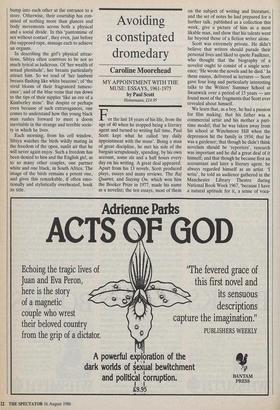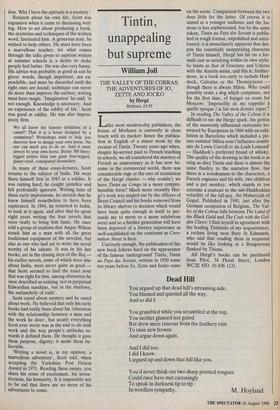Avoiding a constipated dromedary
Caroline Moorehead
MY APPOINTMENT WITH THE MUSE: ESSAYS, 1961-1975
by Paul Scott Heinemann, £14.95
For the last 18 years of his life, from the age of 40 when he stopped being a literary agent and turned to writing full time, Paul Scott kept what he called 'my daily appointment with the muse'. Being a man of great discipline, he met his side of the bargain scrupulously, spending, by his own account, some six and a half hours every day on his writing. A great deal appeared. Apart from his 13 novels, Scott produced plays, essays and many reviews. The Raj Quartet, and Staying On, which won him the Booker Prize in 1977, made his name as a novelist; the ten essays, most of them
on the subject of writing and literature, and the set of notes he had prepared for a further talk, published as a collection this week, give a picture of him as a most likable man, and show that his talents went far beyond those of a fiction writer alone.
Scott was extremely private. He didn't believe that writers should parade their personal lives and liked to quote Faulkner, who thought that the biography of a novelist ought to consist of a single sent- ence: 'He wrote the novels and he died.' In these essays, delivered as lectures — Scott gave four long and particularly interesting talks to the Writers' Summer School at Swanwick over a period of 15 years — are found most of the fragments that Scott ever revealed about himself.
We learn that, as a boy, he had a passion for film making; that his father was a commercial artist and his mother a part- time model; that he was taken away from his school at Winchmore Hill when the depression hit the family in 1934; that he was a gardener; that though he didn't think novelists should be 'reporters', research was important and he did a great deal of it himself; and that though he became first an accountant and later a literary agent, he always regarded himself as an artist. 'I write', he told an audience gathered in the Manchester Library Theatre during National Book Week 1967, 'because I have a natural aptitude for it, a sense of voca- tion. Why I have the aptitude is a mystery.'
Reticent about his own life, Scott was expansive when it came to discussing writ- ing. How to set about producing a book, the mysteries and techniques of the written word, fascinated him. A generous man, he wished to help others. He must have been a marvellous teacher, for what comes through the talks given to aspirant writers at summer schools is a desire to make people feel better. He was also very funny. His advice was probably as good as can be given; words, though important, are ex- pendable, and must be discarded until the right ones are found; technique can never do more than improve the surface; writing must have magic. 'Imagination' he said, 'is not enough. Knowledge is necessary. And an experience of the oddity of life.' Scott was good at oddity. He was also impres- sively firm.
We all know the famous definition of a camel? That it is a horse designed by a committee? Workshops exist to help you discover how to design your own horse. No one can teach you to do so. And it must always be your own horse. Better 300 three- legged ponies than one giant four-legged, glassy-eyed, constipated dromedary.
In many of these essay-lectures, Scott returns to the subject of India. He went there himself first in 1943 as a soldier. It was raining hard; he caught jaundice and felt profoundly ignorant. Writing later of these early impressions, he records that he knew himself nonetheless to have been captivated. In 1964, he returned to India, to look at it again, and after that he spent eight years writing the four novels that were really to bring him fame. He once told a group of students that Angus Wilson struck him as a man with all the great traditional equipment of the novelist, but also as one who had yet to write the novel worthy of his talents. It was in his last books, set in the closing days of the Raj — his earlier novels, some of which were also about India, were never quite as good — that Scott seemed to find the exact note that was right for him, among characters he once described as existing 'not in perpetual Edwardian sunshine, but in the shadows, the melancholy of exile'.
Scott cared about mystery and he cared about work. He believed that only his early books had really been about his 'obsession with the relationship between a man and the work he does', but nearly everything Scott ever wrote was in the end to do with work and the way people's attitudes to- wards it defined them. He thought it gave them purpose, dignity; it made them be- lievable.
'Writing a novel is, in my opinion, a marvellous adventure', Scott said, when accepting the Yorkshire Post Fiction Award in 1971. Reading these essays, you share his sense of excitement, his inven- tiveness, his humanity. It is impossible not to be sad that there are no more of his adventures to come.











































 Previous page
Previous page